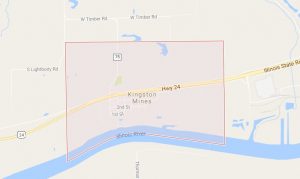Peoria County investigating human remains found at campsite
By Holly Eitenmiller For Chronicle Media — June 14, 2017
Peoria County Coroner Jamie Harwood answered questions at the Gateway Building in Peoria regarding human remains discovered in Kingston Mines Sunday, June 11. A skull belonging to an adult male was found near a campsite there, on the banks of the Illinois River. (Photo by Holly Eitenmiller /for Chronicle Media)
Two days after bones were discovered near a private Peoria County campsite, county investigators have released their findings.
Lodgers preparing for a summer of camping at a private Kingston Mines campsite discovered a human skull on the banks of the Illinois River around 2:30 p.m. on June 11.
Peoria County search and rescue teams were immediately summed to River’s Edge Campgrounds in southern Peoria County, where they continued to comb the area for other evidence and human remains until June 13.
In the meantime, Peoria County Coroner Jamie Harwood, along with a forensic pathologist, performed a preliminary autopsy and released those findings on Tuesday, June 13. The results revealed the remains are that of an adult male.
Decomposition indicates the skull may have been at the campsite for around three months, or longer, until it was found, Harwood said. Until recently, much of the beach areas along the river were under water due to heavy spring rains, but the river has begun to recede.
Harwood also said, initially, the goal was to answer two primary questions; the age and sex of the person. The skull, he said, is “indisputably” that of an adult.
Harwood’s findings rule out the possibility that campers found the remains of Robert Bonzai Bee, Jr. Bee, 13, fled from his home on Sapp Street in Pekin Nov. 17. He was last witnessed by a Pekin Police Department truancy officer that afternoon, and is considered an endangered runaway.
Grassroots groups, such as “Team Bonsai” and “The Officially Finding Robert Bee Discussion Group” have been helping in the search for the missing boy.
The Kingston Mines discovery brought about an immediate reaction from the Bee Facebook community, in hopes that it would bring closure to the case. It did not.

Until recently, the grounds at Rivers Edge Campgrounds, a Peoria County members-only camping site in Kingston Mines, was mostly under water. The Illinois River has begun to recede, and, on May 11, a human skull was discovered by a campsite owner on the riverbank there. (Google maps)
In addition to the skull being that of an adult, Bee also has a marked quality that is easy to discern; his front left adult incisor is partially missing, and what remains of it is in decay.
In another case, Mark P. Bohanan, 60, of Glasford, is considering missing since April 26. According to family members, Bohanan is unable to walk further than 10 feet without a cane, and cannot right himself if he falls.
The Kingston Mines remains cannot be those of Bohanan; decomposition of the Kingston Mines remains began at least a month before the Glasford man came missing.
And there is another file, that of a human torso recovered in Beardstown, Ill. Found by a fisherman on Nov. 13, 2016, the Schuyler County remains were shuttled to McLean County Coroner Dr. Kathleen Davis for an autopsy.
With no extremities or cranium, Davis had no fingerprints or dental records to work with, and the case has grown cold. Harwood said Schuyler County officials inquired into the June 13 autopsy, and were present for a portion of it.
It was determined, he said, that the skull found in Kingston Mines was not related in any way to the Schuyler County torso.
Police searching Kingston Mines did happen upon additional remains, which, at first, appeared to be human. The bones discovered belonged to an animal, likely that of a deer, which resemble the size and shape of the bones in human arms, Harwood said.
Teeth from the skull will be extracted and dentin from within them will be used to harvest DNA, he said. It’s a tedious process, Harwood said, that may take up to six weeks to complete. Following that, he will attempt to match the DNA through a database or with relatives of missing persons.
— Peoria County investigating human remains found at campsite —







